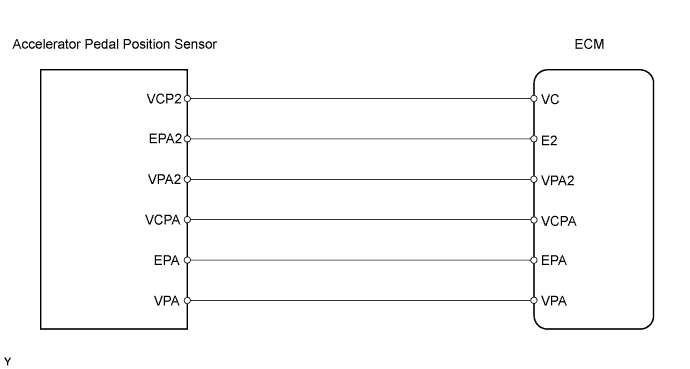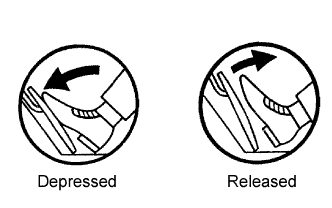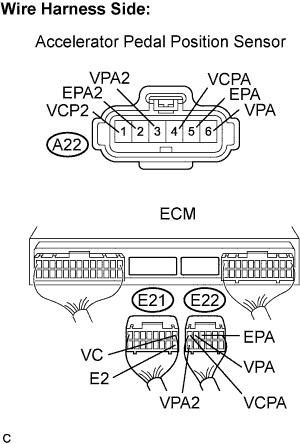DESCRIPTION
WIRING DIAGRAM
INSPECTION PROCEDURE
When using intelligent tester:
READ VALUE USING INTELLIGENT TESTER (ACCELERATOR POSITION)
READ OUTPUT DTC (ACCELERATOR PEDAL POSITION SENSOR DTC IS OUTPUT AGAIN)
CHECK HARNESS AND CONNECTOR (ECM - ACCELERATOR PEDAL POSITION SENSOR)
CHECK ECM (VC, VCPA VOLTAGE)
REPLACE ACCELERATOR PEDAL ROD ASSEMBLY
READ OUTPUT DTC (ACCELERATOR PEDAL POSITION SENSOR DTC IS OUTPUT AGAIN)
When not using intelligent tester:
CHECK HARNESS AND CONNECTOR (ECM - ACCELERATOR PEDAL POSITION SENSOR)
CHECK ECM (VC, VCPA VOLTAGE)
REPLACE ACCELERATOR PEDAL ROD ASSEMBLY
READ OUTPUT DTC (ACCELERATOR PEDAL POSITION SENSOR DTC IS OUTPUT AGAIN)
DTC 19 (1) Accelerator Position Sensor Circuit Malfunction |
DESCRIPTION
- HINT:
- This is the repair procedure of the "accelerator pedal position sensor".
- This electrical throttle system does not use a throttle cable.
- This accelerator pedal position sensor is a non-contact type.
The accelerator pedal position sensor is mounted in the accelerator pedal to detect the opening angle of the accelerator pedal. Since this sensor is electronically controlled with hall elements, accurate control and reliability can be obtained. It has the 2 sensors to detect accelerator position and malfunctions of the accelerator position sensor.In the accelerator pedal position sensor, the voltage applied to pedal terminals VPA and VPA2 of the ECM changes between 0 V and 5 V in proportion to the opening angle of the accelerator pedal. The VPA is a signal to indicate the actual accelerator pedal opening angle which is used for engine control, and the VPA2 is a signal to indicate information about the opening angle which is used for detecting malfunctions. Based on signals input from terminals VPA and VPA2, the ECM judges the current opening angle of the accelerator pedal and controls the injection pump.
DTC No.
| DTC Detection Condition
| Trouble Area
|
19 (1)
| Condition (a), (b), (c) or (d) continues for 2.0 seconds:
(a) VPA is less than or equal to 0.2 V, and VPA2 is less than or equal to 0.5 V
(b) VPA is greater than or equal to 4.8 V
(c) When 3.45 V is greater than or equal to VPA, and VPA is greater than or equal to 0.2 V; and VPA2 is greater than or equal to 4.8 V
(d) "VPA minus VPA2" is less than or equal to 0.02 V
| - Open or short in accelerator pedal position sensor circuit
- Accelerator pedal position sensor
- ECM
|
Condition (a) continues for 0.5 seconds:
(a) VPA is less than or equal to 0.2 V, or VPA2 is less than or equal to 0.5 V
|
- HINT:
- After confirming DTC 19 (1), use the intelligent tester to confirm the throttle valve opening percentage.
Trouble area
| Accelerator pedal position expressed as voltage
|
Accelerator pedal released
| Accelerator pedal depressed
|
ACCEL POS #1
| ACCEL POS #2
| ACCEL POS #1
| ACCEL POS #2
|
VC circuit open
| 0 to 0.2 V
| 0 to 0.2 V
| 0 to 0.2 V
| 0 to 0.2 V
|
VPA circuit open or ground short
| 0 to 0.2 V
| 1.2 to 2.0 V
| 0 to 0.2 V
| 3.4 to 5.3 V
|
VPA2 circuit open or ground short
| 0.5 to 1.1 V
| 0 to 0.2 V
| 2.6 to 4.5 V
| 0 to 0.2 V
|
E2 circuit open
| 4.5 to 5.5 V
| 4.5 to 5.5 V
| 4.5 to 5.5 V
| 4.5 to 5.5 V
|
WIRING DIAGRAM
INSPECTION PROCEDURE
- HINT:
- Read freeze frame data using the intelligent tester. The ECM records vehicle and driving condition information as freeze frame data the moment a DTC is stored. When troubleshooting, freeze frame data can be helpful in determining whether the vehicle was running or stopped, whether the engine was warmed up or not, whether the air-fuel ratio was lean or rich, as well as other data recorded at the time of a malfunction.
When using intelligent tester:
| 1.READ VALUE USING INTELLIGENT TESTER (ACCELERATOR POSITION) |
Connect the intelligent tester to the DLC3.
Turn the ignition switch ON.
Enter the following menus: Powertrain / Engine and ECT / Data List / Accel Position.
Check that the value displayed on the intelligent tester changes when repeatedly depressing and releasing the accelerator pedal.
- OK:
- Value changes.
| 2.READ OUTPUT DTC (ACCELERATOR PEDAL POSITION SENSOR DTC IS OUTPUT AGAIN) |
Clear the DTC (Toyota Fortuner RM000000VR6004X.html).
Start the engine.
Idle the engine for 15 seconds or more.
Read the DTC (Toyota Fortuner RM000000VR6004X.html).
- Result:
Display (DTC output)
| Proceed to
|
DTC 19 (1) is output again
| A
|
No DTC output
| B
|
| 3.CHECK HARNESS AND CONNECTOR (ECM - ACCELERATOR PEDAL POSITION SENSOR) |
Disconnect the A22 accelerator pedal position sensor connector.
Disconnect the E21 and E22 ECM connectors.
Measure the resistance of the wire harness side connectors.
- Standard resistance:
Tester Connection
| Specified Condition
|
A22-1 (VCP2) - E21-1 (VC)
| Below 1 Ω
|
A22-2 (EPA2) - E21-9 (E2)
| Below 1 Ω
|
A22-3 (VPA2) - E22-12 (VPA2)
| Below 1 Ω
|
A22-4 (VCPA) - E22-6 (VCPA)
| Below 1 Ω
|
A22-5 (EPA) - E22-4 (EPA)
| Below 1 Ω
|
A22-6 (VPA) - E22-5 (VPA)
| Below 1 Ω
|
A22-1 (VCP2) or E21-1 (VC) - Body ground
| 10 kΩ or higher
|
A22-2 (EPA2) or E21-9 (E2) - Body ground
| 10 kΩ or higher
|
A22-3 (VPA2) or E22-12 (VPA2) - Body ground
| 10 kΩ or higher
|
A22-4 (VCPA) or E22-6 (VCPA) - Body ground
| 10 kΩ or higher
|
A22-5 (EPA) or E22-4 (EPA) - Body ground
| 10 kΩ or higher
|
A22-6 (VPA) or E22-5 (VPA) - Body ground
| 10 kΩ or higher
|
| | REPAIR OR REPLACE HARNESS OR CONNECTOR |
|
|
| 4.CHECK ECM (VC, VCPA VOLTAGE) |
Disconnect the A22 accelerator pedal position sensor connector.
Turn the ignition switch ON.
Measure the voltage of the ECM connector.
- Standard voltage:
Tester Connection
| Specified Condition
|
E21-1 (VC) - E21-9 (E2)
| 4.5 to 5.5 V
|
E22-6 (VCPA) - E22-4 (EPA)
| 4.5 to 5.5 V
|
| 5.REPLACE ACCELERATOR PEDAL ROD ASSEMBLY |
| 6.READ OUTPUT DTC (ACCELERATOR PEDAL POSITION SENSOR DTC IS OUTPUT AGAIN) |
Clear the DTC (Toyota Fortuner RM000000VR6004X.html).
Start the engine.
Idle the engine for 15 seconds or more.
Read the DTC (Toyota Fortuner RM000000VR6004X.html).
- Result:
Display (DTC output)
| Proceed to
|
DTC 19 (1) is output again
| A
|
No DTC output
| B
|
When not using intelligent tester:
| 1.CHECK HARNESS AND CONNECTOR (ECM - ACCELERATOR PEDAL POSITION SENSOR) |
Disconnect the A22 accelerator pedal position sensor connector.
Disconnect the E21 and E22 ECM connectors.
Measure the resistance of the wire harness side connectors.
- Standard resistance:
Tester Connection
| Specified Condition
|
A22-1 (VCP2) - E21-1 (VC)
| Below 1 Ω
|
A22-2 (EPA2) - E21-9 (E2)
| Below 1 Ω
|
A22-3 (VPA2) - E22-12 (VPA2)
| Below 1 Ω
|
A22-4 (VCPA) - E22-6 (VCPA)
| Below 1 Ω
|
A22-5 (EPA) - E22-4 (EPA)
| Below 1 Ω
|
A22-6 (VPA) - E22-5 (VPA)
| Below 1 Ω
|
A22-1 (VCP2) or E21-1 (VC) - Body ground
| 10 kΩ or higher
|
A22-2 (EPA2) or E21-9 (E2) - Body ground
| 10 kΩ or higher
|
A22-3 (VPA2) or E22-12 (VPA2) - Body ground
| 10 kΩ or higher
|
A22-4 (VCPA) or E22-6 (VCPA) - Body ground
| 10 kΩ or higher
|
A22-5 (EPA) or E22-4 (EPA) - Body ground
| 10 kΩ or higher
|
A22-6 (VPA) or E22-5 (VPA) - Body ground
| 10 kΩ or higher
|
| | REPAIR OR REPLACE HARNESS OR CONNECTOR |
|
|
| 2.CHECK ECM (VC, VCPA VOLTAGE) |
Disconnect the A22 accelerator pedal position sensor connector.
Turn the ignition switch ON.
Measure the voltage of the ECM connector.
- Standard voltage:
Tester Connection
| Specified Condition
|
E21-1 (VC) - E21-9 (E2)
| 4.5 to 5.5 V
|
E22-6 (VCPA) - E22-4 (EPA)
| 4.5 to 5.5 V
|
| 3.REPLACE ACCELERATOR PEDAL ROD ASSEMBLY |
| 4.READ OUTPUT DTC (ACCELERATOR PEDAL POSITION SENSOR DTC IS OUTPUT AGAIN) |
Clear the DTC (Toyota Fortuner RM000000VR6004X.html).
Start the engine.
Idle the engine for 15 seconds or more.
Read the DTC (Toyota Fortuner RM000000VR6004X.html).
- Result:
Display (DTC output)
| Proceed to
|
DTC 19 (1) is output again
| A
|
No DTC output
| B
|






